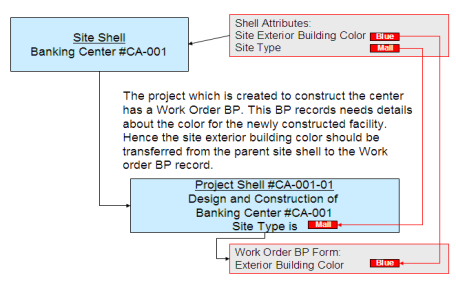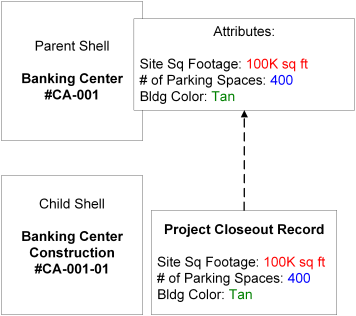
Fields on a business process in a child shell can be setup in Primavera uDesigner to auto-populate from the attribute form of the current shell or any parent shell, or to auto-populate from the upper form of a single-record non-workflow business process under any parent shell. Also, a field on a shell attribute form can be setup to auto-populate from the attribute form of any parent shell, or from the upper form of a single-record business process under any parent shell.
For example, a bank can have multiple banking centers. When a new banking center is commissioned, then a project shell can be used to manage the construction details of the banking center. A Work Order business process, which is created under the project shell contains details including physical characteristics from the Site shell. In this example, that includes the building color, which is auto-populated to the Work Order business process so that the building is painted the correct color.

Note: If a shell is moved to a new place in the shell hierarchy, fields that are auto-populated for that shell retain the values that were populated when the shell was initially created. Auto-population does not reoccur when a shell is moved in the shell hierarchy.
Certain data elements support reverse auto-population. These are specified in Primavera uDesigner. Reverse auto-population means that some values can be automatically updated when other values are modified in a BP form or shell attribute form.
Note: Reverse auto-population does not occur for shells with View-Only status.
Depending on the set up in Primavera uDesigner, reverse auto-population can occur in these instances:
| • | Changes to the data elements in a child shell’s attribute form can result in changes to the attribute form of any parent shell in the shell hierarchy |
| • | Changes to data elements in a BP detail form under a child shell can result in changes to the current shell attribute form or any parent shell attribute form in the shell hierarchy |
For example, When a new banking center is commissioned then a shell instance is used to construct the banking center. The parent shell needs to be updated with data from the Attribute forms of the child shell and from BPs within the child shell.
Also, data stored in a Code and Records-based Manager (such as a Parts Manager) may change based on company-level or project/shell-level BPs, and those changes need to reverse auto-populate back to the attribute form.

Oracle Corporation
Primavera Unifier 9.10 • Copyright © 1998, 2012, Oracle and/or its affiliates. All rights reserved.